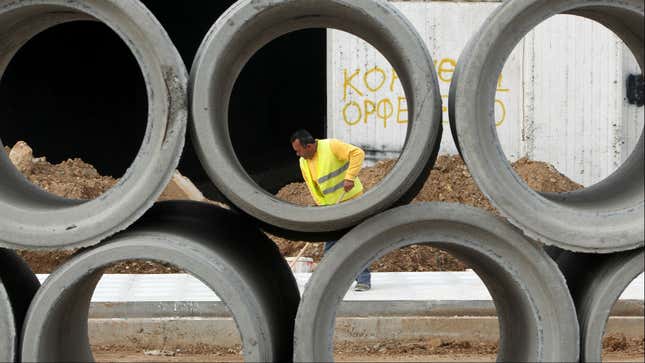
It is pretty outrageous when you think about it.
First Greece goes on a spending spree. Then it lies about its public finances to get into the euro zone. Next it gets two bailout packages totaling hundreds of billions of euros, and more than likely, two more years to sort itself out. But it’s not enough.
Yesterday it was confirmed that Greece needs an additional €30 billion ($39 billion) to cover a financing gap (paywall) caused by a delay in meeting budget targets and a deeper-than-expected recession—ironically created by the austerity imposed in return for the money. The €30 billion figure has been bandied about since September, along with talk that Greece should get until 2016 to meet a euro zone budget surplus target of 4.5%.
The funding gap became more or less official at yesterday’s unveiling of recent findings by troika officials from the European Central Bank (ECB), the European Commission, and the International Monetary Fund (IMF) on Greece’s economic situation and aid needs. These were presented to senior European finance-ministry officials (paywall). Greece’s three key creditors must approve the country’s budget plans and reform progress before they will disperse the next €31.5 installment of Greek aid. Without this next tranche of funding, Greece is expected to be bankrupt within weeks.
Of course, these creditors are at odds over how to finance the newest gap. The IMF wants euro zone governments to write off big chunks of money they’ve lent Greece. Another option includes an interest-rate cut by the ECB on Greek bonds it holds, which the ECB’s leader, Mario Draghi, has so far opposed.
European leaders are clearly desperate to avoid the chaos that would follow a Greek exit and so, some deal will be cut.
Meanwhile, Greece is stuck in an ugly loop. While the country has received billions in emergency aid—and the largest sovereign debt restructuring in history—much of the actual funding is paying the interest on the country’s spiraling debt, i.e., going back to its creditors, the troika. Meanwhile, public services are being cut—outraging the nation’s already hard-hit citizens.
A poll last week showed support is surging for the ultra-nationalist Golden Dawn party, an organization linked to attacks on immigrants, as citizens are increasingly enraged by wage and pension cuts demanded by creditors. Meanwhile the economy continues to worsen as austerity cuts push Greece deeper into recession.
But maybe another €30 billion will help. Let’s hope so.